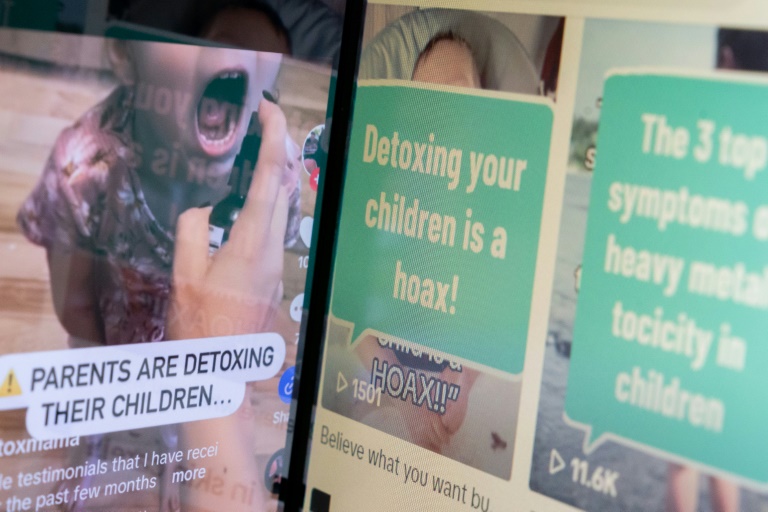SOCIAL
TikTok moms nurture ‘detox for kids’ misinformation

So-called ‘mom-influencers’ often cite personal testimonies to passionately endorse detox sprays or bath treatments, claiming without evidence that they help rid children of toxins – Copyright AFP Stefani REYNOLDS
Anuj Chopra and Marisha Goldhamer
A TikTok army of American moms claiming to be “detox” specialists is pushing unproven treatments for childhood behavioral disorders -– while hiding that their misinformation is actually a marketing campaign aimed at making money.
Influencers with a large following, these mothers typically cite personal testimonies to passionately endorse detox sprays or bath treatments, claiming without evidence that they help rid children of toxins such as heavy metals and parasites.
Their videos, which often garner millions of views on platforms including TikTok, illustrate how unqualified nutrition influencers deftly skirt content moderation rules to peddle potentially harmful health misinformation that experts say is difficult to police.
Claiming to have the answer to mood swings, picky eating and even autism, the influencers are accused of preying on desperate parents and reaping financial rewards through what researchers call predatory multi-level marketing (MLM) schemes.
MLMs are banned on TikTok.
Danica Walker, a self-styled “detoxification specialist” holds up a spray in one video and claims it helped cure her toddler’s “mood issues” within weeks.
Like dozens of similar endorsements on her account, this video is not marked as an advertisement.
But a website linked in her TikTok bio directs users to a company that bears the hallmarks of MLM, a form of direct sales using independent contractors. It sells detox products, including the spray in Walker’s video, and recruits new sales representatives through an “affiliate program.”
Neither Walker nor the MLM company responded to AFP’s request for comment.
Comments under her video such as “Did you get paid for this?” and “It didn’t work for me & it was so expensive” did not elicit a public response from Walker.
– ‘Fake treatment’ –
AFP examined around a dozen of what appeared to be a flood of TikTok accounts of influencer moms promoting scientifically unproven detox products.
The accounts appear to violate TikTok’s community guidelines. Without commenting on the detox influencers, a TikTok spokeswoman told AFP: “Our community guidelines make clear that we don’t allow MLM.”
Two accounts, including Walker’s, were deactivated immediately after AFP flagged them to the spokeswoman.
Many influencers appear to sidestep the possibility of legal challenges with a standard disclaimer: the endorsements are “not medical advice.”
“It has become part of their sales tactic — ‘I’m giving you this information mother-to-mother, not as your doctor,’ so it presumably protects them legally but also connects them with potential consumers,” TikTok misinformation researcher Abbie Richards told AFP.
“The claims these accounts are making could be entirely fabricated in the name of selling merchandise and they aren’t even marked as advertisements.”
People working for MLMs can earn money through commissions from direct sales of products or by recruiting new distributors, according to the US Federal Trade Commission.
The real-life impact of the “pseudoscientific misinformation” is huge, said Jonathan Stea, a clinical psychologist and adjunct assistant professor at the University of Calgary.
“Detox is a scam,” Stea told AFP.
“There’s no compelling scientific evidence to support detox treatments for eliminating ‘toxins’ from the body. Ultimately, a detox bath is fake treatment for a fake condition.”
– ‘Preying on moms’ –
Parents of autistic children in particular have lashed out at influencers for peddling falsehoods for personal gain, including that detox treatments cure symptoms such as speech delays and enable non-verbal children to start singing.
“A lot of you (influencers) are reaching out saying: ‘Hey girl, I know your child has autism. I have the perfect thing for you,’” a mother named Anna Maria said in a TikTok video.
“Cut it out. Stop preying on moms in the special-needs community.”
But seeming to validate the adage that lies spread faster online than the truth, such videos attract far lower engagement and traction than the slick and sentimental detox endorsements.
TikTok appears flooded with unqualified influencers who spread misinformation, from vaccine- and abortion-related falsehoods to health myths, which experts say can have a serious impact on medical decisions.
Last year, the watchdog Media Matters exposed another “predatory” MLM scheme on TikTok to covertly sell weight loss products not approved by US health regulators.
“TikTok’s inability to detect such a large-scale MLM sets a bleak precedent for meaningful moderation of these exploitative schemes,” Media Matters wrote in its report.
“The platform benefited from a significant amount of positive media attention after announcing its MLM ban (in December 2020), but its actual enforcement seems to be failing.”
burs-ac/nro
SOCIAL
Snapchat Explores New Messaging Retention Feature: A Game-Changer or Risky Move?

In a recent announcement, Snapchat revealed a groundbreaking update that challenges its traditional design ethos. The platform is experimenting with an option that allows users to defy the 24-hour auto-delete rule, a feature synonymous with Snapchat’s ephemeral messaging model.
The proposed change aims to introduce a “Never delete” option in messaging retention settings, aligning Snapchat more closely with conventional messaging apps. While this move may blur Snapchat’s distinctive selling point, Snap appears convinced of its necessity.
According to Snap, the decision stems from user feedback and a commitment to innovation based on user needs. The company aims to provide greater flexibility and control over conversations, catering to the preferences of its community.
Currently undergoing trials in select markets, the new feature empowers users to adjust retention settings on a conversation-by-conversation basis. Flexibility remains paramount, with participants able to modify settings within chats and receive in-chat notifications to ensure transparency.
Snapchat underscores that the default auto-delete feature will persist, reinforcing its design philosophy centered on ephemerality. However, with the app gaining traction as a primary messaging platform, the option offers users a means to preserve longer chat histories.
The update marks a pivotal moment for Snapchat, renowned for its disappearing message premise, especially popular among younger demographics. Retaining this focus has been pivotal to Snapchat’s identity, but the shift suggests a broader strategy aimed at diversifying its user base.
This strategy may appeal particularly to older demographics, potentially extending Snapchat’s relevance as users age. By emulating features of conventional messaging platforms, Snapchat seeks to enhance its appeal and broaden its reach.
Yet, the introduction of message retention poses questions about Snapchat’s uniqueness. While addressing user demands, the risk of diluting Snapchat’s distinctiveness looms large.
As Snapchat ventures into uncharted territory, the outcome of this experiment remains uncertain. Will message retention propel Snapchat to new heights, or will it compromise the platform’s uniqueness?
Only time will tell.
SOCIAL
Catering to specific audience boosts your business, says accountant turned coach

While it is tempting to try to appeal to a broad audience, the founder of alcohol-free coaching service Just the Tonic, Sandra Parker, believes the best thing you can do for your business is focus on your niche. Here’s how she did just that.
When running a business, reaching out to as many clients as possible can be tempting. But it also risks making your marketing “too generic,” warns Sandra Parker, the founder of Just The Tonic Coaching.
“From the very start of my business, I knew exactly who I could help and who I couldn’t,” Parker told My Biggest Lessons.
Parker struggled with alcohol dependence as a young professional. Today, her business targets high-achieving individuals who face challenges similar to those she had early in her career.
“I understand their frustrations, I understand their fears, and I understand their coping mechanisms and the stories they’re telling themselves,” Parker said. “Because of that, I’m able to market very effectively, to speak in a language that they understand, and am able to reach them.”Â
“I believe that it’s really important that you know exactly who your customer or your client is, and you target them, and you resist the temptation to make your marketing too generic to try and reach everyone,” she explained.
“If you speak specifically to your target clients, you will reach them, and I believe that’s the way that you’re going to be more successful.
Watch the video for more of Sandra Parker’s biggest lessons.
SOCIAL
Instagram Tests Live-Stream Games to Enhance Engagement

Instagram’s testing out some new options to help spice up your live-streams in the app, with some live broadcasters now able to select a game that they can play with viewers in-stream.
As you can see in these example screens, posted by Ahmed Ghanem, some creators now have the option to play either “This or That”, a question and answer prompt that you can share with your viewers, or “Trivia”, to generate more engagement within your IG live-streams.
That could be a simple way to spark more conversation and interaction, which could then lead into further engagement opportunities from your live audience.
Meta’s been exploring more ways to make live-streaming a bigger consideration for IG creators, with a view to live-streams potentially catching on with more users.
That includes the gradual expansion of its “Stars” live-stream donation program, giving more creators in more regions a means to accept donations from live-stream viewers, while back in December, Instagram also added some new options to make it easier to go live using third-party tools via desktop PCs.
Live streaming has been a major shift in China, where shopping live-streams, in particular, have led to massive opportunities for streaming platforms. They haven’t caught on in the same way in Western regions, but as TikTok and YouTube look to push live-stream adoption, there is still a chance that they will become a much bigger element in future.
Which is why IG is also trying to stay in touch, and add more ways for its creators to engage via streams. Live-stream games is another element within this, which could make this a better community-building, and potentially sales-driving option.
We’ve asked Instagram for more information on this test, and we’ll update this post if/when we hear back.
-

 MARKETING6 days ago
MARKETING6 days agoEffective Communication in Business as a Crisis Management Strategy
-

 SEARCHENGINES6 days ago
SEARCHENGINES6 days agoGoogle Won’t Change The 301 Signals For Ranking & SEO
-

 SEO6 days ago
SEO6 days agobrightonSEO Live Blog
-

 PPC6 days ago
PPC6 days ago9 Ecommerce Trends to Boost Your Business in 2024
-

 SEO7 days ago
SEO7 days agoHow To Write ChatGPT Prompts To Get The Best Results
-

 SEO4 days ago
SEO4 days agoGoogle March 2024 Core Update Officially Completed A Week Ago
-

 WORDPRESS4 days ago
WORDPRESS4 days ago9 Best WooCommerce Multi Vendor Plugins (Compared)
-
SEARCHENGINES5 days ago
Daily Search Forum Recap: April 25, 2024














